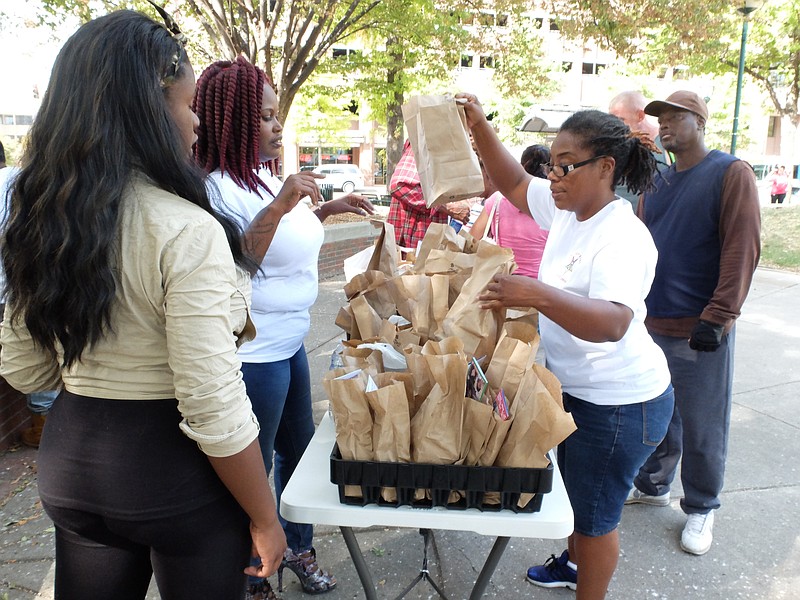A few weeks ago, as Chattanooga Police Department Chief David Roddy spoke to city council members about a growing panhandling problem, he quoted research: 92 percent of panhandlers use their money to buy alcohol, drugs and sex.
"It's not a hand up, not a handout," the chief said. "Actually, it's a foot placed on the shoulder pushing someone down."
Wait a sec.
Two immediate problems here.
First, the double standard. We upstanding homeowners can drink all we want, but not panhandlers? Alcohol is a prime driver of our tourist economy - from homemade whiskey to craft breweries every other city block. So why is it OK for us to raise a glass, but wrong for someone sleeping on a loading dock to gin up?
Second, the claim. Ninety- two percent? It sounds fishy. What methodology was used? Where did Roddy find these numbers?
Here's where: Dr. Robert Marbut.
Not long ago, Roddy encountered Marbut through a presentation for the International Association of Police Chiefs. When cities need help with homelessness, they often hire Marbut, a consultant who practices what he calls the "Velvet Hammer" or "Velvet Gavel" approach.
First, outlaw handing out free food and supplies to the homeless.
"Street feeding is one of the worst things to do, because it keeps people in homeless status," he told NPR. "I think it's very unproductive, very enabling, and it keeps people out of recovery programs."
Then, Marbut advises cities to build large shelters - the one in St. Petersburg is warehoused in an old jail, according to the HuffPost - which are open 24/7, surrounded by social services and don't turn anyone away.
Marbut, who often pretends to be homeless for a few days in the city that's hired him, does his own street research.
"He says he's done two studies on the issue, one in San Antonio in 2009 involving 150-200 homeless panhandlers and the other in Pinellas County involving 250 panhandlers. According to Dr. Marbut, the methodology was to give money to panhandlers then follow them to watch what they did with it," said Rob Simmons, public information officer for the Chattanooga police.
View other columns by David Cook
That's hardly scientific.
Marbut Consulting has been hired by at least 26 different cities, including San Antonio, Key West, Fla., and Daytona Beach, three tourist towns with significant homeless populations.
Sound familiar?
It makes me wonder if Roddy's casual mentioning of Marbut's research is actually casual at all.
According to the HuffPost report on Marbut:
-Since 2016, 21 cities have restricted passing out food to the homeless poor.
-Since 2011, in a survey of 187 cities, bans on public camping have increased by 60 percent.
-Bans on sitting or lying down have increased by 43 percent.
-Bans on panhandling or begging have increased by 25 percent.
Is that next for Chattanooga?
There are multiple groups that serve food each week to homeless downtown Chattanoogans.
Imagine the moral and constitutional ramifications of police ticketing or arresting local church groups while they pass out soup. (the Rev. Barry Kidwell? the Rev. Darrell Wyke? Food Not Bombs? Are you reading this?)
Imagine the consequences to our city's soul if handing out warm socks to the poor becomes a crime.
Imagine the deep hypocrisy if Chattanooga - the Outdoor City of the East - made sleeping outside illegal.
Or asking for money.
Or sitting down on a sidewalk.
When we read the tea leaves - a high tourist population, growing downtown wealth, exorbitant housing costs, all colliding with a homeless population - we must ask:
What is the future of homelessness here?
-City Hall just announced a new interagency council to end homelessness. (Exactly how many Programs-To-End-Homelessness have we had in this town? I count at least four since Bob Corker was mayor.)
Is this new council finely crafted and well-intentioned? Or is it a Trojan horse designed to create a housing plan that actually just sweeps undesirable people out of downtown?
City Hall said this new council will search for a consultant to help craft policy.
Is that going to be Marbut?
-Roddy's panhandling ordinances.
Why would a new police chief approach the city council about increasing efforts to ban panhandling?
Yes, being approached by a panhandler is uncomfortable and unpleasant. (So is homelessness.)
But in other cities, such a ban often begets even more bans: against free food, public camping, sitting and lying down, and so on.
-The return of Miller Park.
When it reopens this summer after a $10 million renovation, will the park freely attract the same folks - homeless, church groups feeding them, Patten Towers residents - as it once did?
The city has said: yes.
"Open and inclusive of everyone," Marissa Bell, former spokeswoman for City Hall, previously promised.
And Simmons - the police PIO - said he was not aware of any contract with Marbut.
Good.
The larger point is this:
We cannot outlaw what we helped create.
As long as tourists from across the country come here to work and play thanks to a service-worker economy while rent and condos skyrocket in cost and value, then you have poverty and homelessness. One feeds the other. It is the yin and yang of our downtown.
This issue is part of a larger question that continues to demand our attention:
Who gets to belong in downtown Chattanooga?
And who doesn't?
David Cook writes a Sunday column and can be reached at dcook@timesfreepress.com or 423-757-6329. Follow him on Facebook at DavidCookTFP.

